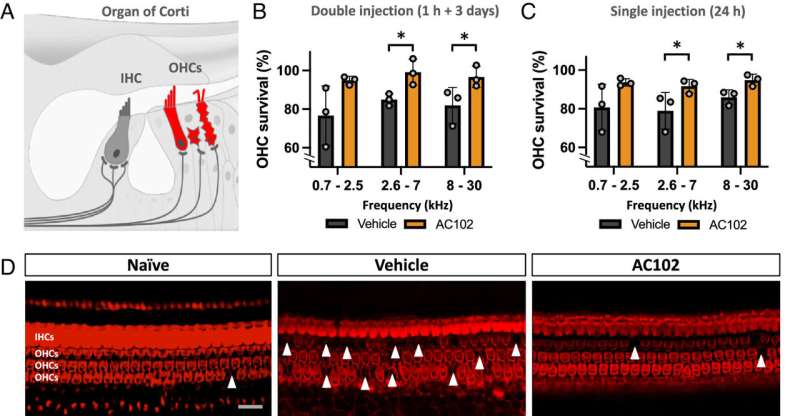This article has been reviewed according to Science X's editorial process and policies. Editors have highlighted the following attributes while ensuring the content's credibility:
fact-checked
peer-reviewed publication
proofread
Novel compound AC102 restores hearing in preclinical models of sudden hearing loss

A single application of the novel compound AC102 almost completely restores noise-induced hearing loss in preclinical models. This is the key finding of a recent publication in the Proceedings of the National Academy of Sciences by the Berlin-based start-up AudioCure Pharma.
Sudden hearing loss is often treated with anti-inflammatory corticosteroids without regulatory approval or reliable evidence of effectiveness. Therefore, new treatment options are urgently needed for this condition.
For the study, noise-induced hearing loss was used to evaluate the efficacy of AC102 in a preclinical model. A single middle ear application of AC102 after noise trauma restores hearing to near pre-trauma levels after 14 days. In contrast, treatment without the active compound resulted in profound hearing loss.
Further experiments show that AC102 targets the two suspected main causes of sudden hearing loss in the inner ear: It prevents the death of outer hair sensory cells and protects the connections between neurons and the auditory nerve.
"It is fascinating how a single molecule has such diverse effects in the inner ear. In laboratory experiments, we see that AC102 protects neurons by increasing their energy production and reducing the production of free radicals. At the same time, it stimulates the regeneration of neurons and sensory cells enabling the reformation of lost connections," explains Professor Hans Rommelspacher, CSO and founder of AudioCure Pharma.
Sudden hearing loss is a debilitating condition that can severely impair speech understanding and have a negative impact on a patient's life. Corticosteroids have been used to treat this condition for 50 years, despite lack of approval. Also, their effectiveness has been questioned.
Recently, a large study (HODOKORT) showed that more than 60% of patients with sudden hearing loss did not fully recover after corticosteroid treatment. Dr. Reimar Schlingensiepen, CEO of AudioCure Pharma, explains, "The HODOKORT study highlights the treatment gap for sudden hearing loss. We are therefore very excited about the promising effects of AC102 in our preclinical models and hope that patients will also benefit from it."
Following successful safety and tolerability testing, AC102 is currently being evaluated for efficacy in a pan-European Phase 2 clinical study in patients with sudden hearing loss.
More information: Hans Rommelspacher et al, A single dose of AC102 restores hearing in a guinea pig model of noise-induced hearing loss to almost prenoise levels, Proceedings of the National Academy of Sciences (2024). DOI: 10.1073/pnas.2314763121




















